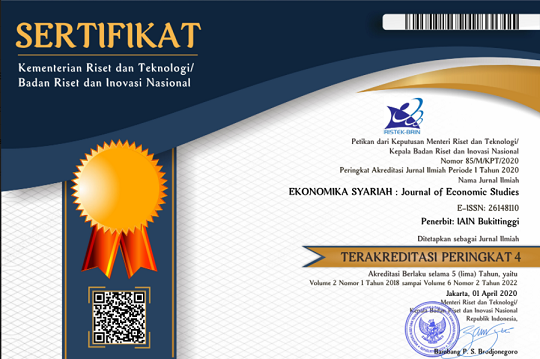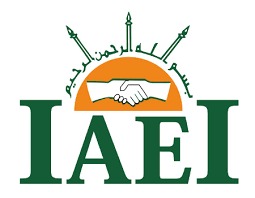The Effectiveness of Sharia Audit in Islamic Financial Institution
DOI:
https://doi.org/10.30983/es.v8i2.8977Keywords:
audit syariah, Efektivitas, lembaga keuangan syariahAbstract
Sharia audit in Islamic financial institutions plays an important role in ensuring that operations, products, and services offered are in accordance with sharia principles to maintain the integrity, transparency, and accountability of the institution. However, sharia auditors face various challenges in conducting sharia audits, such as technical issues, lack of management support, and the absence of comprehensive sharia auditing standards. This qualitative research aims to describe the effectiveness of sharia audit implementation by analyzing the audit framework and audit work papers at Bank Nagari Syariah Business Unit through a phenomenological approach, with data collected through in-depth interviews with bank leaders. The results showed that the implemented sharia audit framework includes the structure of the sharia supervision organization, the scope of the audit, to reporting and follow-up. Sharia audits are proven to increase customer confidence as they provide assurance that the bank's products and services have undergone strict supervision in accordance with sharia principles. Ongoing monitoring from OJK and regular audits by external auditors help maintain audit quality and effectiveness, creating a robust compliance system that contributes to the stability, accountability and reputation of banks in the Islamic finance industry.
Audit syariah pada lembaga keuangan syariah berperan penting dalam memastikan operasional, produk, dan layanan yang ditawarkan sesuai dengan prinsip-prinsip syariah untuk menjaga integritas, transparansi, dan akuntabilitas lembaga. Namun, auditor syariah menghadapi bermacam tantangan dalam pelaksanaan audit syariah, seperti permasalahan teknis, kurangnya dukungan manajemen, dan belum adanya standar audit syariah yang komprehensif. Penelitian kualitatif ini bertujuan mendeskripsikan efektivitas pelaksanaan audit syariah dengan menganalisis kerangka kerja audit dan kertas kerja audit di Bank Nagari Unit Usaha Syariah melalui pendekatan fenomenologis, dengan data yang dikumpulkan melalui wawancara mendalam kepada pimpinan bank. Hasil penelitian menunjukkan bahwa kerangka kerja audit syariah yang diterapkan mencakup struktur organisasi pengawasan syariah, ruang lingkup audit, hingga pelaporan dan tindak lanjut. Audit syariah terbukti meningkatkan kepercayaan nasabah karena memberikan jaminan bahwa produk dan layanan bank telah melalui pengawasan ketat sesuai prinsip syariah. Pemantauan berkelanjutan dari OJK dan audit rutin oleh auditor eksternal turut menjaga kualitas dan efektivitas audit, menciptakan sistem kepatuhan kokoh yang berkontribusi pada stabilitas, akuntabilitas, dan reputasi bank dalam industri keuangan syariah.
References
AAOIFI. (2020). Accounting and Auditing Organization for Islamic Financial Institutions. https://aaoifi.com/?lang=en
Alam, M., Ahmad, A., Ahmed, M., & Uddin, M. (2023). Audit Syariah Bank Islam di Bangladesh: Praktik Saat Ini dan Langkah ke Depan. Jurnal Penelitian Akuntansi Terapan, 24(5), 986–1003.
Algabry, L., Alhabshi, S. M., Soualhi, Y., & Othman, A. H. A. (2021). Assessing the effectiveness of internal Sharīʿah audit structure and its practices in Islamic financial institutions: A case study of Islamic banks in Yemen. Asian Journal of Accounting Research, 6(1), 2–22. https://doi.org/10.1108/AJAR-04-2019-0025
Antonio, M. S. (2001). Bank syariah: Dari teori ke praktik. Gema Insani.
Arwani, A. (2018). Issues and Challenges of Shariah Auditing in Islamic Financial Institution and Corporate Governance Compliance. Media Riset Akuntansi, Auditing & Informasi, 18(2), 169–186. https://doi.org/10.25105/mraai.v18i2.3008
Bavaresco, G., Dickson, G., Camargo, P., Santos, T., & Marinho Mezzadri, F. (2024). Transparency and Accountability in Brazilian National Sport Organisations. Cogent Social Sciences, 10(1), 2355560. https://doi.org/10.1080/23311886.2024.2355560
Bouheraoua, S., & Djafri, F. (2022). Adoption of the COSO methodology for internal Sharīʿah audit. ISRA International Journal of Islamic Finance, 14(2), 221–235. https://doi.org/10.1108/IJIF-04-2020-0071
Damayanti;, M. (2016). Isu dan Tantangan Audit Syariah di Lembaga Keuangan Syariah di Indonesia (Depok). STEI SEBI. //repo-ta.sebi.ac.id/index.php?p=show_ detail&id=1221&keywords=
Faizi, F., & Shuib, M. S. B. (2024). Sharia Governance in Islamic Financial Institutions: A Comparative Review of Malaysia and Indonesia. EL DINAR: Jurnal Keuangan Dan Perbankan Syariah, 12(1), Article 1. https://doi.org/10.18860/ed.v12i1.25135
Fauzi, A., & Supandi, A. F. (2019). Perkembangan Audit Syariah Di Indonesia. Jurnal Istiqro, 5(1), 24. https://doi.org/10.30739/istiqro.v5i1.339
Faza’, M., & Badwan, N. (2024). Compliance of Sharia Audit in Islamic Banks and Islamic Financial Institutions in Palestine: A Literature Review. Journal of Islamic Economics and Finance Studies, 5(1), 42–66. https://doi.org/10.47700/jiefes.v5i1.7712
Flesher, D. L., & Zanzig, J. S. (2000). Management accountants express a desire for change in the functioning of internal auditing. Managerial Auditing Journal, 15(7), 331–337. https://doi.org/10.1108/02686900010344601
Ghani, N. L. A., Ariffin, N. M., & Rahman, A. R. A. (2019). The Measurement of Effective Internal Shariah Audit Function in Islamic Financial Institutions. International Journal of Economics, Management and Accounting, 27(1), Article 1. https://doi.org/10.31436/ijema.v27i1.600
Ghani, N. L. A., & Rahim, A. (2015). An Analysis of Shari’ah Audit Practices in Islamic Banks in Malaysia. Jurnal Pengurusan, 43, 107–118. https://doi.org/10.17576/pengurusan-2015-43-10
Gunawan, M. (2023). Praktik Dalam Audit Dan Peran Auditor Syariah (karakteristik, Konseptual, Dan Tantangan). Prosiding Konferensi Ilmiah Akuntansi, 10(0), Article 0. https://jurnal.umj.ac.id/index.php/KIA/article/view/19474
Hassan, A. F. S., & Haridan, N. M. (2019). Shariah Auditing and Shariah Compliance Assurance in Malaysian Islamic Banks. Global Journal Al-Thaqafah, 61–71. https://doi.org/10.7187/GJATSI112019-6
Hirsanuddin, H., & Martini, D. (2023). Good Corporate Governance Principles in Islamic Banking: A Legal Perspective on the Integration of TARIF Values. Journal of Indonesian Legal Studies, 8(2), 935–974. https://doi.org/10.15294/jils.v8i2.70784
Husna, Vira A., and Hesi Eka Puteri. 2023. “Pengaruh Good Corporate Governance Dan Leverage Terhadap Kinerja Keuangan Perusahaan-Perusahaan Di Jakarta Islamic Index Periode 2016-2020.” Jurnal Ekonomi Dan Manajemen 20 (2).
Islam, K. M. A., & Bhuiyan, A. B. (2021). Determinants of the Effectiveness of Internal Shariah Audit: Evidence from Islamic Banks in Bangladesh. The Journal of Asian Finance, Economics and Business, 8(2), 223–230. https://doi.org/10.13106/JAFEB.2021.VOL8.NO2.0223
Ismail, A. G. (2013). Agency Theory in Explaining Islamic Financial Contracts. Middle East Journal of Scientific Research.
Jensen, M. C., & Meckling, W. H. (1976). Theory of the firm: Managerial behavior, agency costs and ownership structure. Journal of Financial Economics, 3(4), 305–360. https://doi.org/10.1016/0304-405X(76)90026-X
Jusri, A. P. O., & Maulidha, E. (2020). Peran Dan Kompetensi Auditor Syariah Dalam Menunjang Kinerja Perbankan Syariah. JAS (Jurnal Akuntansi Syariah), 4(2), 222–241. https://doi.org/10.46367/jas.v4i2.255
Kasim, N., Sanusi, Z. M., Mutamimah, T., & Handoyo, S. (2013). Assessing the current practice of Auditing in Islamic Financial Institutions in Malaysia and Indonesia. International Journal of Trade, Economics and Finance, 414–418. https://doi.org/10.7763/IJTEF.2013.V4.328
Mardiyah, Q., & Mardian, S. (2015). Praktik Audit Syariah Di Lembaga Keuangan Syariah Indonesia. Akuntabilitas, 8(1), 1–17.
Mihajat, M. I. S. (2019). Chapter 19 Shariah Governance Framework in Islamic Banking and Financial Institutions in Indonesia: A Proposed Structure. In T. Azid, A. A. Alnodel, & M. A. Qureshi (Eds.), Research in Corporate and Shari’ah Governance in the Muslim World: Theory and Practice (pp. 239–248). Emerald Publishing Limited. https://doi.org/10.1108/978-1-78973-007-420191021
Muhammad, R. (2018). Shariah governance for Islamic banking: What can be learnt from Malaysia? Proceeding of Conference on Islamic Management, Accounting, and Economics, 1, 111–123.
Mulyany, R., Furqani, H., & Ibrahim, S. (2021). Meninjau kembali idealisme audit syariah bagi lembaga keuangan Islam. Al- Uqud : Jurnal Ekonomi Islam, 5(2), 184–202.
Nurhasanah, S., Umiyati, U., & Senjani, Y. P. (2021). Audit Syariah. Penerbit Salemba Empat.
Ridwanto, Abdullah, M. W., & Muchlis, S. (2023). Problematika Auditing Syariah Dalam Pelaksanaan Shariah Compliance di Lembaga Keuangan Syariah: Sebuah MetaSintesis. Al-Sharf Jurnal Ekonomi Islam, 4(3), 312–328.
Risnaeni, U. S., & Sholeha, A. (2022). The Role And Competence Of Sharia Auditors In Supporting The Performance Of Sharia Banking. Muhasabatuna : Jurnal Akuntansi Syariah, 4(1), Article 1. https://doi.org/10.54471/muhasabatuna.v1i1.1700
Rozaidin, Muhamad, and Hendri Hermawan Adinugraha. 2020. “Penerapan Akuntansi Pondok Pesantren (Studi Pada Koperasi Pondok Pesantren Al Hasyimi Kabupaten Pekalongan).” EKONOMIKA SYARIAH: Journal of Economic Studies 4 (2): 123–35.
Safieddine, A. (2009). Islamic Financial Institutions and Corporate Governance: New Insights for Agency Theory. Corporate Governance: An International Review, 17(2), 142–158. https://doi.org/10.1111/j.1467-8683.2009.00729.x
Sani, S. D., & Abubakar, M. (2021). A proposed framework for implementing risk-based Shari’ah audit. Journal of Financial Reporting and Accounting, 19(3), 349–368. https://doi.org/10.1108/JFRA-02-2020-0041
Shahar, W. S. S. W., Hassin, W. S. W., & Zan, U. M. S. M. (2018). Shariah audit for Islamic financial institutions (IFI’s): Issues and challenges. Reports on Economics and Finance, 4(4), 151–158. https://doi.org/10.12988/ref.2018.8114
Subardi, H. M. P. (2019). Kebutuhan AAOIFI Sebagai Standar Akuntansi Keuangan Syariah Dalam Harmonisasi Penyajian Laporan Keuangan. Owner, 3(1), 16. https://doi.org/10.33395/owner.v3i1.81
Susanti, Septria. 2019. “Pengaruh Prinsip Accountability Dan Independency Terhadap Preferensi Muzakki Membayar Zakat Di Lembaga Amil Zakat Izi PKPU Kota Bukittinggi.” Ekonomika Syariah 3 (1).
Tuzzahroh, F., & Laela, S. F. (2022a). Sharia Audit and Shariah Compliance of Islamic Financial Institutions: A Bibliometric Analysis. Jurnal Ekonomi Syariah Teori Dan Terapan, 9(6), 815–833. https://doi.org/10.20473/vol9iss20226pp815-833
Tuzzahroh, F., & Laela, S. F. (2022b). Sharia Audit and Shariah Compliance of Islamic Financial Institutions: A Bibliometric Analysis. Jurnal Ekonomi Syariah Teori Dan Terapan, 9(6), 815–833. https://doi.org/10.20473/vol9iss20226pp815-833
Yaacob, H. (2012). Issues and Challenges of Shariah Audit in Islamic Financial Institutions: A Contemporary View. SSRN Electronic Journal. https://doi.org/10.2139/ssrn.2175700
Downloads
Published
Issue
Section
Citation Check
License
Copyright (c) 2024 Sandra Ayu Ayu, Maisya Pratiwi, Wemi Aryuna

This work is licensed under a Creative Commons Attribution-ShareAlike 4.0 International License.
Authors who publish with this journal agree to the following terms:
- Authors retain copyright and grant the journal right of first publication with the work simultaneously licensed under a Creative Commons Attribution-ShareAlike 4.0 International License that allows others to share the work with an acknowledgment of the work's authorship and initial publication in this journal.
- Authors are able to enter into separate, additional contractual arrangements for the non-exclusive distribution of the journal's published version of the work (e.g., post it to an institutional repository or publish it in a book), with an acknowledgment of its initial publication in this journal.
- Authors are permitted and encouraged to post their work online (e.g., in institutional repositories or on their website) prior to and during the submission process, as it can lead to productive exchanges, as well as earlier and greater citation of published work (See The Effect of Open Access).











